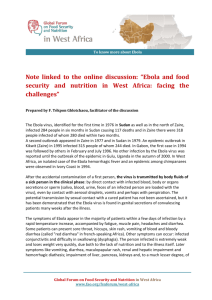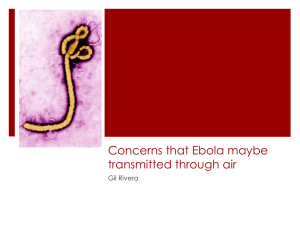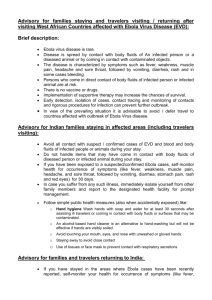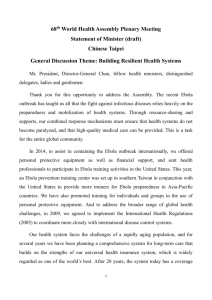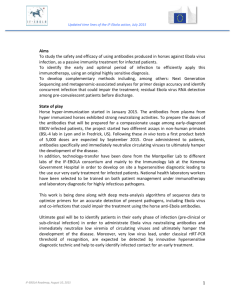A critical assessment of past and current Ebola Outbreaks
advertisement
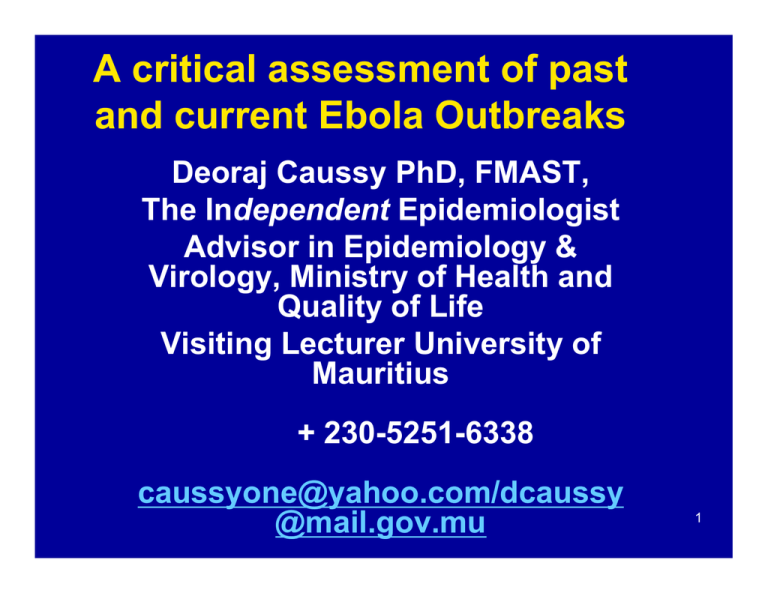
A critical assessment of past and current Ebola Outbreaks Deoraj Caussy PhD, FMAST, The Independent Epidemiologist Advisor in Epidemiology & Virology, Ministry of Health and Quality of Life Visiting Lecturer University of Mauritius + 230-5251-6338 caussyone@yahoo.com/dcaussy @mail.gov.mu 1 Named after the Ebola river in Zaire where it was discovered in 1976 Four species of Ebola discovered Ivory Cost, Sudan, Zaire and Reston It is an enveloped RNA virus They are called Filovirus because they appear a filaments but can be pleomorphic 2 Lessons from 1976 outbreaks • Ebola Fever resembles many many diseases – Malaria, typhoid, yellow fever, influenza • Virus was spread through unsterilized needles – 13/17 staff became infected, 11/13 died • Some quarter of a million people were quarantined – Villages were isolated in huts as in smallpox days • House-to-house visit contact tracing – Visited 550 villages and identified 50 infected villages – Team relied on legacy of smallpox manpower • Team from Atlanta, Antwerp and Kinshasa worked in coordination with DRC government 3 HOW IS EBOLA TRANSMITTED No evidence, personal contact with a non-febrile, nonsymptomatic, infected individual during the incubation or convalescent periods (except sexual) DIRECT TRANSMISSION: from person-to-person with virusinfected body fluids such as: – blood, saliva, vomitus, stools and possibly sweat. – Contacts with body fluid during preparation for burial – Sexual transmission: from genital secretions of convalescents several weeks after illness. INDIRECT TRANSMISSION THROUGH: – Infected fomites ( surgical instruments, needles etc.) – Infected aerosol especially in laboratory maneuver 5 Ebola disease progression IT MAY TAKES 2 TO 21 DAYS FOR THE DISEASE TO APPEAR AFTER EXPOSURE 6 2. Largest outbreak in Uganda in 2000 1. First found 1n 1976 in Central Africa, in 2007 and -2009 7 GOT MORE DEFINED WITH RESEARCH 8 Water, air and food do NOT transmit the virus 9 Successful Infection control measures stamped out past epidemics 10 1) Face-shield or surgical mask and 2) eye protection to prevent droplet contact 3) Gloves to prevent skin or mucous membrane contact with organic fluid of the patient for any one coming within 3 feet of the patient 11 Or Make shift hospital (note cordon sanitaire) Isolation ward if available Isolation ward Gulu, Uganda MSF Isolation ward Proper barrier technique (PPE) *universal precautions during specimen collection from sick, dead or transport Field Laboratory BSL-3-4 facilities and precautions and testing 13 Disinfect re-usable medical items Wear protective clothing Incinerate infected items Also disinfect household items with a registered hospital disinfectant or 1:100 household bleach The corpse should be wrapped in sealed leak proof materials and cremated or buried promptly in a sealed casket Do not embalm the corpse Allow relative to watch from a safe distance or else they say “Astronauts” came to exterminate 15 Current Outbreaks 16 Why the current outbreaks are recalcitrant to control? • It is not a new virus, the virus has not mutated • The face of Africa has changed – More urbanization – More invasion of forest for food and agriculture – More commute from village to cities – Less developed health infrastructure Also late response created an endemic situation Response PRIM HC REP SAMP RES begins A FAILED ALERT SYSTEM Potential Cases Prevented CASES MISSED OPPORTUNITY LACK OF EARLY RESPONSE DAY Risk of Spread depends on geography and traffic volume Note: Kenya and South Africa are at moderate risk 19 Projection of Trend • CDC – has made a grim projection of 1.5 million people being infected by 30th September 2014 • WHO – projects more than 20,000 cases by November 2nd 2014 • Gomes et al – Over 1000 deaths by August 2014 20 WHO travel advisory WHY WAS A TRAVEL BAN PUT ON TORONTO FOR SARS OUTBREAK WITH LOWER NUMBER OF CASES? 21 Barriers to Control Measures 1. Cultural practices 2. Handling/washing the dead 3. Initially no time for education or talking to families 4. Rush to bury the infected dead 5. Families hid ill relatives 6. Humanizing burials, 1. allow family to attend at a distance or use protective gear 7. Suspicion, lack of trust 8. Marburg/Ebola was hard to differentiated from other typical illnesses. Malaria, yellow fever 9. Lack of adequate infection control resources Partners in 2007 DRC outbreaks 1.WHO: World Health Organization 2.GORAN: Global Alert and Response Network 3.MSF: Medecins sans Frontiere 4.Red Cross 5.PHAC: Public Health Agency of Canada 6.Centre National de Recherche Scientifique, France 7.SDC: Swiss Agency for Development and cooperation 8.CDC: Centers for Disease Control and Prevention 9.Ministry of health, DRC 10.Others Team: 1) epidemiologist, 2) virologist, 3) logisticians, 4) experts in social mobilization, 5) infection control, 6) medical anthropology, 7) laboratory diagnostician 23 Use locally accepted media Meeting with community leaders Target person at risk No cases at the end of 2 incubation period how long is that?): end of outbreak ( Risk for Mauritius • Ebola CAN ONLY enter via an infected persons – Someone who is NOT ILL will NOT transmit the disease – Our surveillance system is active • Ports of entry • In the community • Our bat populations are NOT infected with Ebola – A sick person will NOT infect an animal • The risk of an infected animal infecting our bat population is almost zero 25 How the Disease Spreads 3.Spread to village Spread to hospital 2.Spread to family 1.Invasion in ecosystem 26 Drug and Vaccines Ethical Issues 3 Vaccines developed • Public Health Canada ZMAP Drug still in experimental stage Claimed to be effective on the American patient but not the ? Spanish missionary – never tested in humans – Donation of 1000 doses got put on hold • US-NIH – Vaccine now undergoing human phase 1 trial • GSK – Undergoing human phase 1 trial now Question for Globalization and clinical trial: who will benefit and be able to 27 afford these drugs/vaccine when proven effective? Who would have served as trials subjects? Thank you ! STOP HERE 28

